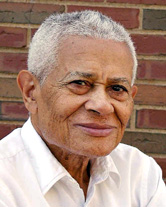December 1981: William Worthy ’42 vs. the Feds
When the plane carrying daring journalist William Worthy ’42 touched down at Logan Airport in December 1981, among his greeters were federal agents who confiscated books Worthy had acquired while reporting in post-Shah Iran. The multi-volume set, known in Iran as Documents from the U.S. Espionage Den, were reprints of classified CIA and State Department documents that had fallen into Iranian hands after the 1979 U.S. Embassy takeover.

But the veteran newsman was skilled at confronting — and overcoming — abusive federal authority, and he decided that winning back the books was worthy of a fight. A longtime board member of the Massachusetts ACLU, Worthy and two fellow journalists involved in the incident teamed with the union and sued the feds. They won, collecting $16,000 in damages from the Justice Department, which agreed to destroy all fingerprints and investigative records collected during the investigation.
Worthy subsequently brought the documents, plus others, to the attention of The Washington Post, which published a five-part series titled “Iran Documents Give Rare Glimpse of a CIA Enterprise,” in 1982.
Now 84 and retired in Boston, he’s asked if he got weary of having to battle to do his job. “Not weary, but it was not pleasant always to have to defend what you believe in,” he says. “By temperament, I am not really inclined to get weary.”
Nor wavering in his beliefs. Pearl Harbor was attacked in December of his senior year at Bates, after which Worthy was quoted in The Bates Student: “We must now work to prevent war hysteria and intolerance and to retain civil liberties intact. And let us not identify God and Christ with our armed forces. War is murder and hell on earth….”
A conscientious objector during World War II, Worthy entered journalism and initially tangled with the U.S. government after traveling to off-limits China in 1956 to report for the New York Post, The Afro-American Newspaper and CBS News.
His passport was seized, but he kept moving ahead, winning a Nieman Fellowship at Harvard, a Ford Foundation grant and freedom-of-the-press awards in the 1950s. He worked in the United States and traveled to Latin America and Cuba (no passport required) to report and help produce the well-known ABC-TV documentary Yanki No! and to cover the Castro revolution.
It was from Cuba that Worthy returned to Miami in 1961, where he was detained, questioned and then, six months later, arrested and sentenced to jail for re-entering the United States without a passport, technically a violation of the McCarthy-era McCarran Act. But in a noted civil liberties court decision, Worthy beat the jail rap.
In “The Ballad of William Worthy,” protest singer Phil Ochs sang about the incident: “William Worthy isn’t worthy to enter our door, / went down to Cuba, he’s not American any more. / But somehow it is strange to hear the State Department say, / ‘You are living in the free world, in the free world you must stay.'”
Though involved in the growing ’60s protest movement, Worthy was surprised by the tribute in a musical sense. “I studied at South End Music School [now the Community Music School of Boston] growing up,” he says, “so I was more interested in classical music.”
Hear a clip of “The Ballad of William Worthy,” from The Best of Broadside 1962-1988: Anthems of the American Underground from the Pages of Broadside Magazine, Washington, D.C. : Smithsonian Folkways Recordings, 2000.